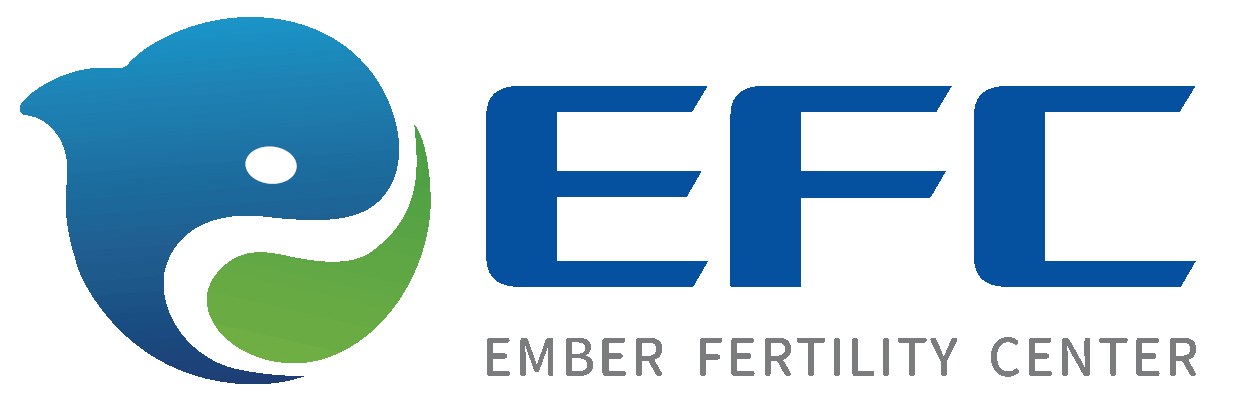Key points of fertility drugs
- Fertility drugs are key elements in many fertility treatments, from the most basic to the more complex.
- These medications regulate reproductive hormones, stimulate egg production, and enhance the chances of successful fertilization and implantation.
- The different types of fertility drugs are prescribed by our specialist and may be the only treatment, such as stimulating ovulation, or be a vital aspect of a treatment like in vitro fertilization (IVF).
- Fertility medications that can benefit women and men require close monitoring through ultrasounds and blood tests to adjust dosages and ensure safety.

At Ember, everyone is a VIP – very important patient
And we have a thing for the small things: Each Ember patient gets a dedicated fertility coordinator, a patient’s personal care guide through every clinic detail, from the very first phone call to meeting your little miracle. Schedule your appointment today using our online self-scheduling tool.
What are fertility drugs?
Fertility drugs are a cornerstone of reproductive medicine playing a critical role in effectively treating infertility, enhancing fertility and supporting successful assisted reproductive technology (ART) treatments. These medications are designed to regulate or stimulate the reproductive system, aiding individuals and couples in their journey toward parenthood. Fertility drugs may be oral, vaginal or self-injected.
Fertility medications for women serve specific functions:
- Stimulating ovulation.
- Triggering or preventing ovulation at specific times during treatments.
- Promoting embryo implantation and healthy pregnancy.
These medications address a range of fertility challenges, such as irregular ovulation, poor egg quality or hormonal imbalances. The medications typically work by mimicking or influencing the natural reproductive hormones, such as follicle-stimulating hormone (FSH), luteinizing hormone (LH), and gonadotropin-releasing hormone (GnRH). While fertility medications are highly effective, their use usually requires close monitoring by our fertility providers to ensure proper dosage and minimize potential side effects.
Whether the treatment is medication alone, IVF, intrauterine insemination (IUI) or another fertility treatment, understanding the types of fertility medications, their purposes and what to expect can help patients feel informed and empowered. Ember providers work closely with each patient and couple to help them understand the use of fertility drugs.
Fertility medications for men
Human chorionic gonadotropin (hCG) can help with the low testosterone levels in men. Other drugs we can use for men are off-label uses of female fertility medications. These include clomiphene, which can increase male sperm counts due to low testosterone. Anastrozole is another, which is used to treat breast cancer and can be used off-label to help men with symptoms of low testosterone such as low sex drive and erectile dysfunction.
Types of fertility medications
There are several categories of fertility medications, each serving a specific purpose in the fertility treatment process.
Ovulation induction drugs
These drugs are designed to stimulate the ovaries to produce and release eggs, especially for individuals with irregular or absent ovulation:
- Clomiphene citrate (Clomid brand name): This oral medication blocks estrogen receptors, tricking the body into producing more FSH and LH, which stimulate ovulation.
- Letrozole (Femara): Often used off-label for ovulation induction, letrozole works by reducing estrogen levels, prompting the ovaries to release eggs.
Gonadotropins
Gonadotropins are injectable medications containing FSH, LH or a combination of both. They are commonly used in IVF to stimulate the ovaries to produce multiple eggs:
- FSH drugs (Gonal-F, Follistim): Stimulates the growth of ovarian follicles and eggs.
- hCG (human chorionic gonadotropin): Mimics the LH surge, triggering the final maturation and release of eggs during ovulation.
GnRH agonists and antagonists
The gonadotropin releasing hormone (GnRH) agonists and antagonists are medications that control the timing of ovulation by suppressing natural hormone production. They are often used in IVF cycles to prevent premature ovulation:
- GnRH agonists (Lupron): These temporarily suppress ovulation, allowing fertility specialists to better control the process.
- GnRH antagonists (Cetrotide, Ganirelix): Prevent premature ovulation by blocking LH surges.
Progesterone and estrogen hormones
Progesterone is a steroid hormone that promotes the healthy growth of the uterine lining in preparing for embryo implantation. Doctors often prescribe it after ovulation stimulating medications have suppressed progesterone.
Estrogen is sometimes used to promote egg growth before retrieval. It also helps with the uterine lining for embryo implantation and for a healthy pregnancy.
Additional fertility medications
- Human menopausal gonadotropin (hMG): Combines FSH and LH to stimulate ovarian follicles.
- Metformin: Sometimes prescribed for individuals with polycystic ovary syndrome (PCOS) to regulate insulin and improve ovulation.
Fertility drugs in assisted reproductive technologies like IVF & IUI
Fertility medications are tailored to the specific needs of each patient and are used in conjunction with assisted reproductive technologies such as IVF and IUI. In IUI they are used to produce multiple eggs before sperm is inserted into the uterus.
The timeline for stimulation medications lasts one-and-a-half to two weeks. Embryo transfer medications are given for three months (a few weeks before transfer and around 10 more weeks after transfer). Following is how they fit into ART processes.
Ovarian stimulation: Medications like gonadotropins stimulate the ovaries to produce multiple eggs, increasing the chances of retrieving healthy, mature eggs for fertilization.
Ovulation control: GnRH agonists or antagonists are used to suppress natural ovulation, allowing the fertility specialist to control the timing of egg retrieval.
Egg maturation and trigger shot: An hCG injection, known as the “trigger shot,” is given to induce the final maturation of eggs before retrieval in IVF or ovulation in IUI.
Luteal phase support: Progesterone supplements support the uterine lining after ovulation or embryo transfer, creating a favorable environment for implantation.
Estrogen and progesterone use
Estrogen may be prescribed during an IVF cycle for various reasons. It can be used to stimulate egg growth or to improve the chances of embryo implantation, particularly during a frozen embryo transfer, by thickening the uterine lining.
Estrogen is available in multiple forms but is generally given as an injection. Often, estrogen is administered for about two to three weeks leading up to an IVF cycle to prepare the body for the frozen embryo transfer and for optimal outcomes.
Progesterone is essential for preparing the uterine lining for embryo implantation and supporting early pregnancy. If an IVF treatment cycle resulted in a successful pregnancy, progesterone is often continued for the first 6-12 weeks post pregnancy. This medication may be injected, taken orally or as a vaginal suppository.
Other fertility supplements
Supplements are often prescribed after embryo transfer in IVF or following ovulation in IUI. These are available as vaginal suppositories, injections or oral capsules.
Other supplements can help those trying to conceive get the nutrients they need. The specific supplements depend on the individual’s health needs. That is why we recommend that patients trying to conceive check with our specialists or other healthcare providers before taking supplements that may aid in fertility.
Folic acid is a nutrient that can help prevent birth defects and is regularly recommended for those trying to conceive. While it does not negatively affect fertility, folic acid has not been proven to help with fertility.
Monitoring and managing fertility medications
Using fertility medications requires careful monitoring to ensure safety and effectiveness. During treatment, patients may undergo regular blood tests and ultrasounds to measure hormone levels and track the growth of ovarian follicles.
Close monitoring helps our providers adjust medication dosages and minimizes the risk of complications, such as ovarian hyperstimulation syndrome (OHSS).
Risks & side effects of fertility drugs
While fertility medications are generally well-tolerated, they may cause side effects that can vary from patient to patient. These can include:
- Bloating.
- Mood swings.
- Headaches.
- Mild abdominal discomfort.
- Heavy periods.
- Dizziness.
- Breast tenderness.
- Vaginal dryness.
- Increased urination.
Are fertility drugs right for you?
Fertility drugs are an integral part of many treatment plans, but their use depends on individual circumstances. Factors such as age, medical history, and the underlying cause of infertility play a role in determining the right medications and protocol. Our fertility specialist will create a customized treatment plan tailored to your unique needs and goals.
Understanding costs and insurance coverage
Fertility medications are expensive and one of the most expensive components in the IVF process. We alert patients that they should be prepared to spend thousands of dollars on these medications, depending on the type and dosage required.
Some medications, like oral ovulation inducers, are relatively affordable, while injectable gonadotropins and other advanced treatments may be more expensive. Insurance coverage for fertility medications also varies, so it’s essential to check your policy and explore financing options if needed.
For more information or to schedule a consultation, contact us to discuss the options that best suit your needs. Let the journey to parenthood begin with knowledge, support and expert care.




